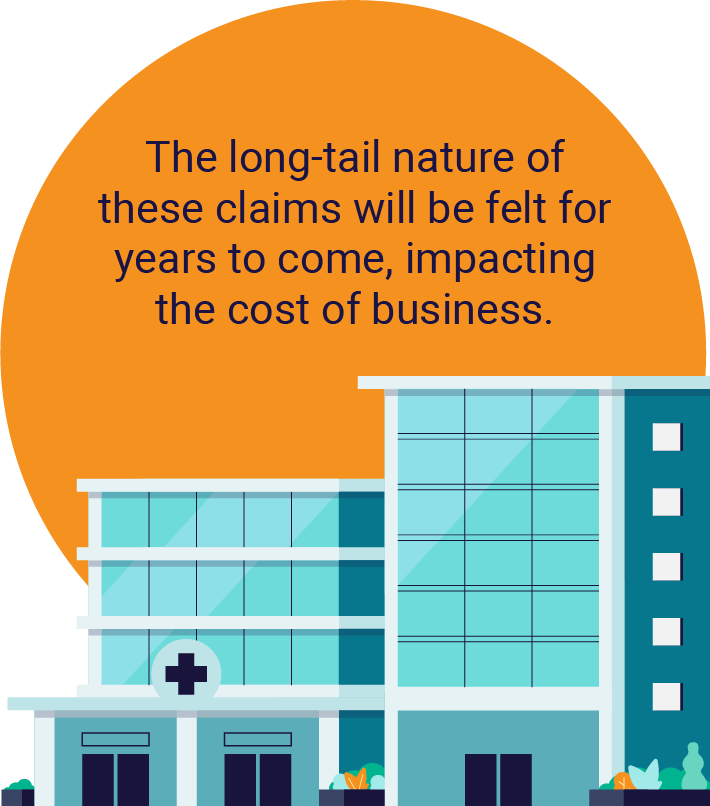|
It’s hard to overstate the impact of COVID-19 on our communities and the businesses we serve. And while the situation continues to change, and hopefully will improve in time, the impacts to insurance will be felt for many months and years to come. Brokers and risk managers should keep these key areas of focus in mind as we navigate these issues throughout 2021 and beyond.
Key Workers Compensation Impacts of COVID-19
|
Transmission prevention
|
|
Government agency guidance is evolving — monitor and swiftly implement new recommendations, including:
|
| ✔ |
Using cleaning log sheets |
| ✔ |
Posting signage requiring social distancing and masks |
| ✔ |
Supplying PPE |
| ✔ |
Documenting training efforts, incidents of noncompliance, and steps to enforce safety protocols |
| ✔ |
Maintaining notification procedures, contact tracing, and other actions taken to determine work-relatedness of exposures |
| ✔ |
Learn more about vaccination from the CDC’s Essential Workers Covid-19 Vaccine Toolkit. |
|
|
Despite vaccine1 advancements, guidelines2 to minimize the spread will remain in place throughout much of 2021.
|
|
|
Claims issues
|
|
Cataloging compliance and preparedness efforts is a key component of navigating COVID-19 claims and helping to minimize additional liability.
|
|
Timely claims reporting is critical; delayed claims typically:
|

|
|
Are harder to investigate
|

|
|
Are more likely to involve litigation
|
|

|
|
Cost more overall
|

|
|
Take longer for injured workers to return
|
|
|
More than 20 states3 have workers compensation presumptions of compensability rules in place. These laws shift the burden to the employer of proving that an employee’s COVID-19 injury was not work related.
|
|
Long-term impacts
|
|
COVID impacts vary by patient; while many recover fully, some experience relapses and new symptoms for weeks or months.
|
|
Longer-term health impacts include:
|
| ✔ |
Shortness of breath |
| ✔ |
Fatigue |
| ✔ |
Cognitive issues |
| ✔ |
Cardiovascular effects |
| ✔ |
Gastrointestinal issues |
| ✔ |
Intolerance to physical or mental activity |
| ✔ |
Low-grade fever |
| ✔ |
Muscle and joint pain |
|
|
|
|
|
Other workers compensation impacts
|
|
Injury creep can occur when injured workers face treatments delays if providers:
|

|
|
Some facilities may postpone certain elective surgeries based on capacity challenges
|

|
|
Physical therapy or medical evaluations may be less frequent or be managed virtually by telemedicine
|
|
|
Some businesses have adjusted operations, downsized, or closed temporarily; workers compensation impacts can include:
|
| ✔ |
Reduced WC claims volume for some businesses |
| ✔ |
Limited light duty or return to work opportunities |
| ✔ |
Switching costs to train workers on different jobs |
|
|
All these factors can increase claim durations and create new workplace risks.
|
|
|
|
|
Contact your representative today to see how we can help.
|
|
From risk control guidance to claims handling expertise, we’re here for you.
|
|
|
1. https://www.cdc.gov/coronavirus/2019-ncov/vaccines/8-things.html
2. https://www.cdc.gov/coronavirus/2019-ncov/your-health/need-to-know.html
3. https://www.ncci.com/Articles/Pages/COVID-19.aspx
Your safety and well-being are our primary concern. These suggestions are general in nature, so you should ensure that any activities you contemplate comply with all federal, state, and local COVID-19 orders impacting your facilities or operations as well as CDC guidelines for social distancing, hygiene, and other recommended best practices.
Our risk control services are advisory only. We assume no responsibility for: managing or controlling customer safety activities, implementing any recommended corrective measures, or identifying all potential hazards.
No attempt has been made to interpret any referenced codes, standards, or regulations. Please refer to the appropriate government authority for interpretation or clarification.
|











